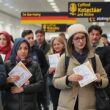A German professor of public law, Volker Boehme-Neßler, has expressed concerns over irregularities in the recent Bundestag election. According to him, a significant number of absentee votes from Germans living abroad may not have been counted due to a delay in their arrival, which he considers a serious electoral error.
Boehme-Neßler, a professor at the University of Oldenburg, stated that this violation of the principle of universality in the election could have affected the outcome, as thousands of voters from abroad may not have had the opportunity to cast their ballots. The exact extent of the problem will only become clear in the coming days, once the absentee ballots are received and verified, he added.
While the German Constitutional Court does not typically annul an election solely due to irregularities, the professor emphasized that the court will examine whether the error was “mandates-relevant” meaning whether it could have influenced the distribution of seats in the Bundestag. Given the close outcome of the election, the possibility of a mandate-relevant error is not to be ruled out, he said.
Although a re-election is unlikely, Boehme-Neßler suggested that the Constitutional Court might choose to count the delayed but timely received absentee votes, thereby correcting the electoral error. This could potentially alter the composition of the Bundestag and the balance of power, especially if the Social Democratic Party (SPD) were to gain additional seats.
However, the professor expressed skepticism about the possibility of a re-election, as the Constitutional Court tends to prioritize a stable and functional Bundestag. The court’s process can take up to 1.5 years and even if the error is corrected, the political implications could be significant.
In the long run, Boehme-Neßler expects reforms to the electoral law, including the possibility of voting in German consulates, which he believes would be a sensible solution. He emphasized that the issue of absentee voting is no longer a marginal concern, but a topic of political discussion and he is convinced that reforms will be implemented. The professor stressed that the issue is not just about expatriates who have lost interest in Germany, but also about expats who want to participate in the country’s political process.





